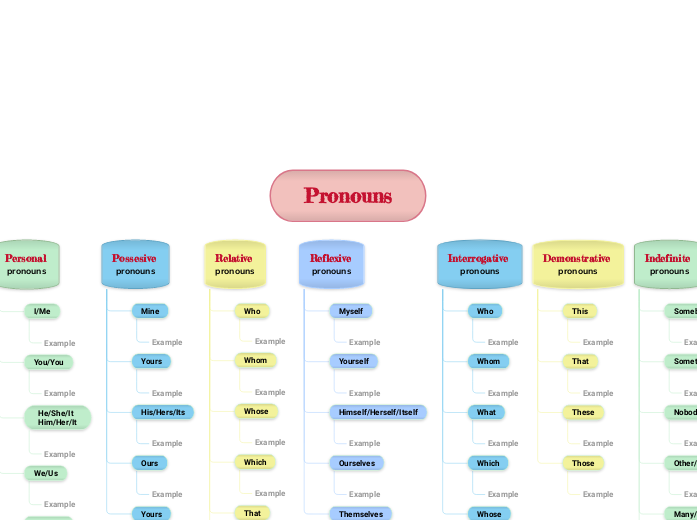English Pronouns
Use this mind map to understand how pronouns are used in different situations and practice by creating contexts.
Keywords: grammar, language


Mer som dette
Use this template to learn the pronouns in English. Pronouns are the parts of speech used instead of nouns to avoid repetition. Depending on the situations in which they are used, they have different forms.
The types of pronouns are:
Personal pronouns
Possessive pronouns
Relative pronouns
Reflexive pronouns
Demonstrative pronouns
Interrogative pronouns
Indefinite pronouns
Personal pronouns are the pronouns that refer to specific people or things. They can change depending on the person, number, gender, or case.
Examples of personal pronouns, singular and plural form:
I/Me
You/You
He/She/It Him/Her/It
We/Us
You/You
They/Them
Possessive pronouns show that something belongs to someone.
Examples of possessive pronouns:
Mine
Yours
His/Hers/Its
Ours
Yours
Relative pronouns describe nouns in terms of how they relate to other words.
Examples of relative pronouns:
Who
Whom
Whose
Which
That
What
Reflexive pronouns are used when the subject of a sentence is also the object of the sentence.
Examples of reflexive pronouns:
Myself
Yourself
Himself/Herself/Itself
Ourselves
Themselves
Demonstrative pronouns point to and identify a noun or a pronoun. They are used in place of particular things to show which one we’re discussing.
Examples of demonstrative pronouns:
Somebody/Someone
Something/Anything
Nobody/Nothing
All
Other/Another
Both/Each
Many/Most
Some/Few
None
Such
Interrogative pronouns are the pronouns used in questions. In sentences, when the pronoun is a subject, the verb will precede the pronoun.
Examples of interrogative pronouns:
Who
Whom
What
Which
Whose
’Who’ and ‘whom’ are used to refer to people and which is used for animals and things.
Indefinite pronouns refer to a thing or person that is identifiable, but not specified.
Examples of indefinite pronouns:
This
That
These
Those
Complete the template by adding examples of phrases with these pronouns. In this way, you will retain information easier.
Pronouns - a word that can function as a noun phrase used by itself and that refers either to the participants in the discourse.
An indefinite pronoun is a pronoun that refers to a person or a thing without being specific.
Demonstrative pronouns are pronouns that point to specific objects. They function as subjects or objects.
An interrogative word or question word is a function word used to ask a question,
Reflexive pronouns are words ending in -self or -selves that are used when the subject and the object of a sentence are the same. They refer back to an earlier noun or pronoun.
A relative pronoun is a pronoun that marks a relative clause. They link one part of a sentence to another.
Possessive pronouns show that something belongs to someone. Replaces noun in phrases.
Personal pronouns are pronouns that are associated primarily with a particular grammatical person – They represents people places or things.
Write phrases as examples.
Tankekart hjelper deg med å brainstorme, etablere relasjoner mellom begreper, organisere og generere ideer.
Tankekartmaler er imidlertid en enklere måte å komme i gang på, ettersom de er rammeverk som inneholder informasjon om et bestemt emne med veiledende instruksjoner. Tankekartmaler sørger for en struktur som kombinerer alle elementene i et bestemt emne og fungerer som et utgangspunkt for ditt personlige tankekart. De er en ressurs som gir deg en praktisk løsning for å lage et tankekart om et bestemt emne, enten det er i forbindelse med jobb eller utdanning.
Mindomo gir deg smarte maler for tankekart som gjør at du kan fungere og tenke uanstrengt.
Beskrivende emner
Emner med bakgrunnstekst
Standardgren
Fjerne maldataene
Du kan velge mellom en rekke maler for tankekart fra Mindomos bedrifts- eller utdanningskontoer, eller du kan lage dine egne tankekartmaler fra bunnen av. Et hvilket som helst tankekart kan gjøres om til en mind map-mal ved å legge til flere veiledende notater til et av temaene.